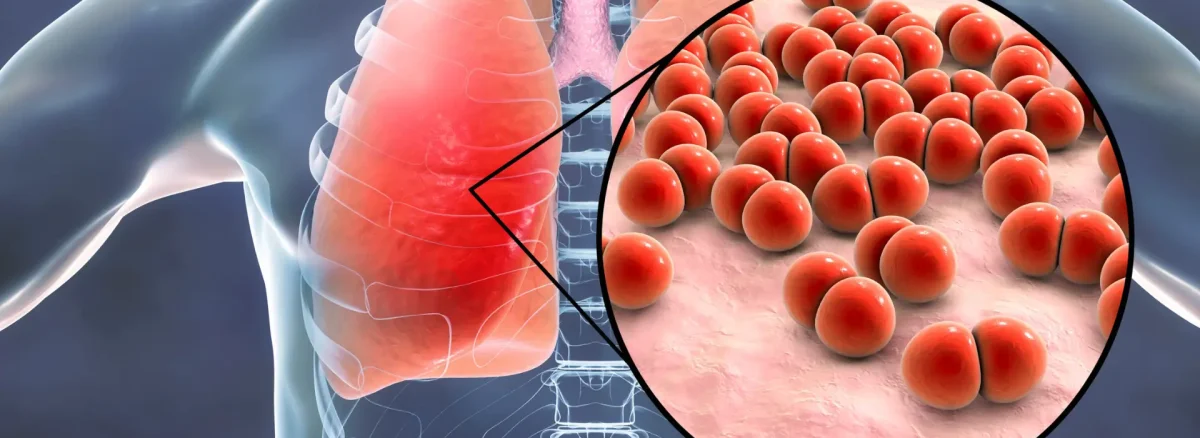- September 25, 2025
- Web Editorial Board
- Health Guide
What is Pneumonia? What Causes It?
Pneumonia, medically known as an inflammation of the lung tissue, typically develops as a result of infections caused by bacteria, viruses, or fungi. When inflammation occurs in the lungs, the air sacs (alveoli) fill with fluid and inflammatory cells, which makes breathing difficult.
The most common causes of pneumonia include:
- Bacteria (especially Streptococcus pneumoniae)
- Viruses (influenza, COVID-19, RSV, etc.)
- Rarely, fungi (in people with weakened immunity).
What are the symptoms of Pneumonia?
Pneumonia can often begin with cold or flu-like symptoms. Initially, a runny nose, mild cough, and fatigue may be seen. The condition then worsens with rising fever, chest pain, a productive cough (with phlegm), and shortness of breath.
Pneumonia symptoms can vary from person to person, but the most common are:
- High fever and chills
- Cough (sometimes productive)
- Shortness of breath and rapid breathing
- Chest pain
- Malaise, fatigue
- Headache and muscle-joint pain
- Confusion or altered consciousness in the elderly
Who is at Risk?
Pneumonia can affect anyone, but some groups are at a higher risk:
- People over the age of 65
- Children under the age of 5
- Individuals with chronic diseases (COPD, asthma, heart disease, diabetes)
- People with weakened immune systems (cancer, HIV, those taking immunosuppressive drugs)
- Smokers
- Patients in intensive care or those on a ventilator
How does Pneumonia spread?
The microbes that cause pneumonia usually spread through droplets. It can be transmitted when droplets scattered into the air during an infected person’s coughing, sneezing, or speaking are inhaled. There is also a possibility of transmission through shared items (cups, spoons, etc.).
How is Pneumonia treated?
Pneumonia treatment varies depending on the microbe causing it:
- Bacterial pneumonia: Usually treated with antibiotics.
- Viral pneumonia: A specific medication is often unnecessary; rest, fluid intake, and antiviral drugs, if needed, are used.
- Fungal pneumonia: Requires antifungal drugs (a rare condition).
Additionally, supportive treatments such as drinking plenty of fluids, rest, using fever-reducing medications, and oxygen therapy may be required.
What are the medications for Pneumonia?
The drugs used in treatment vary according to the patient’s age, health status, and the causative agent of the infection. Generally:
- Antibiotics: Amoxicillin, macrolides (azithromycin, clarithromycin), cephalosporins
- Antiviral drugs: Medications like oseltamivir for influenza-related pneumonia
- Fever reducers and painkillers: Paracetamol, ibuprofen
- Supportive treatments: Oxygen, fluid supplementation, if necessary
Frequently Asked Questions About Pneumonia
1- What is the difference between pneumonia and the flu?
The flu affects the upper respiratory tract, while pneumonia causes **inflammation in the lungs**.
2- Is pneumonia contagious?
Yes, it can spread through **droplets** from coughing and sneezing.
3- In which season is pneumonia most common?
It is more prevalent during the **winter and autumn** months.
4- Can pneumonia be treated at home?
Mild cases can improve at home with antibiotics and rest; **severe cases require hospitalization**.
5- Is there a vaccine for pneumonia?
Yes, the **pneumococcal vaccine** is recommended, especially for those in risk groups.
6- What are the symptoms of pneumonia in children?
Rapid breathing, fever, loss of appetite, cyanosis (bluish skin), and restlessness.
7- What happens if pneumonia is not treated?
If left untreated, there is a risk of **respiratory failure**, **sepsis**, and death.
8- Does smoking increase the risk of pneumonia?
Yes, smoking weakens the **lung’s defense system**.
9- What can be done to prevent pneumonia?
Getting vaccinated, avoiding smoking, adhering to hygiene rules, and protecting against the flu are necessary.
10- Can pneumonia recur?
Yes, it can reappear, especially in people with **low immunity**.
References
- Mayo Clinic
- NHS
- WebMD


